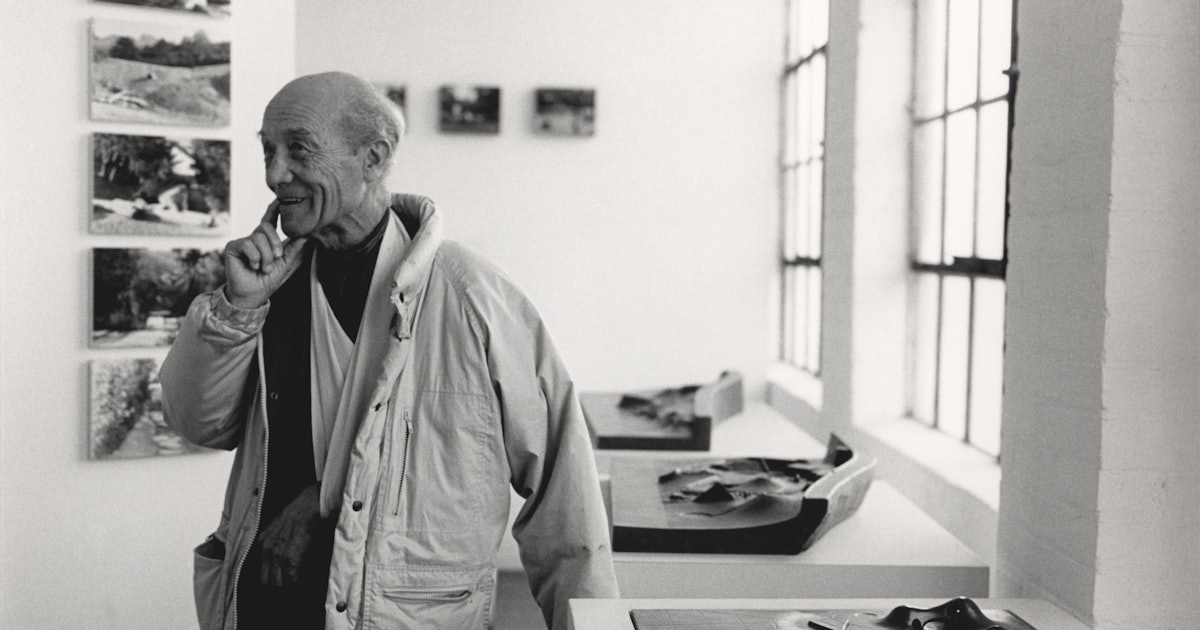A 40th anniversary is a big deal for any institution. For The Noguchi Museum in Long Island City, New York, celebrating quadragenarian status next year means not only toasting a major milestone but also delving into the rich history and legacy of its founder, the Japanese American sculptor Isamu Noguchi. To do so, the Noguchi has mounted a sprawling exhibition titled “Against Time: The Noguchi Museum’s 40th Anniversary Reinstallation” in both its indoor space and outdoor sculpture garden. Running through September 14, 2025, “Against Time” reimagines the museum’s very first second-floor installation from 1985, featuring over 60 of Mr. Noguchi’s most significant works, from his early brass and wood sculptures influenced by his time in Constantin Brancusi’s studio to his later pieces done in granite and marble.
“I found a blueprint showing the original layout for these galleries in our archive,” Matt Kirsch, curator and director of research at The Noguchi Museum, tells W. “But I didn’t feel too bound by the notion of recreating Noguchi’s space. It became more of an adaptation.”
The result is an exhibition that pays homage to Noguchi, his vision, and his lifetime of work, drawing from the museum’s permanent collection and historical archives. Sculptures are far from the only thing on view, however—there are also stage sets the artist designed for choreographers like Martha Graham and Erick Hawkins.
Isamu Noguchi, Foot Tree, 1928.
Photograph by Kevin Noble

Isamu Noguchi, Red Lunar Fist, 1944.
Photograph by Nicholas Knight

Isamu Noguchi, Figure, 1945 (cast 1986).
Photograph by Kevin Noble

To refresh Noguchi’s original vision for the museum, Kirsch and his colleagues delved into the archives—which, to be fair, the curator says he does on a daily basis anyway.
“There wasn’t much of a photo record of these particular galleries from 1985-88, but there were a few extra pictures and descriptive mentions scattered throughout newspaper and magazine articles written about the museum when it opened,” he adds. “And there are still a few people on staff whose brains I could pick, who were present in the early years of the museum and remembered some details.”
The idea for the show came after the Noguchi Museum helped organize the first traveling retrospective on Noguchi in England and Europe, which featured works on loan that had been off view for decades. “We had been thinking about some sort of back-to-basics reset when they returned to New York,” Kirsch says. “Especially since our last installation of the permanent collection for these galleries was in 2009.”
Isamu-Noguchi, Memorial to Buddha, 1957.
Photograph by Kevin Noble

Isamu Noguchi, Set elements for Martha Graham’s ‘Cave of the Heart,’ 1946 (fabricated 1983).
Photograph by Kevin Noble

Discovery was the name of the game while constructing this exhibition. “I had a good enough sense of which of the earlier models for unrealized projects to include—there are a few early concepts and monuments, especially for the play environments, that Noguchi considered to be ‘seeds’ for ideas that he would approach again and again throughout his career,” Kirsch says. “The Bolt of Lightning…Memorial to Ben Franklin [sculpture], for instance, was an idea that Noguchi first proposed in 1933 and that was actually realized in 1984, a year before the museum opened. I think that’s a case of Noguchi highlighting his persistence in returning to old ideas.”
Even in the final days of mounting “Against Time,” the curators were still finding new pieces of information that painted a clearer picture of Noguchi as both a person and an artist. “It’s always surprising to me how much of an experiment the museum seemed to be for Noguchi,” Kirsch says. “In re-reading some of the interviews with him from when the museum opened, he admitted he didn’t really know how much of an audience the museum would have, or if it would exist indefinitely. It was obviously his passion project—but also kind of a lark!”

